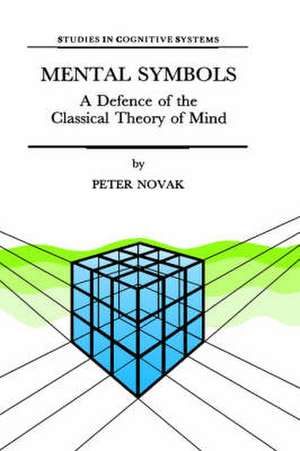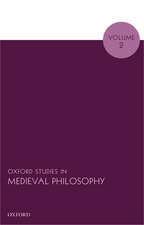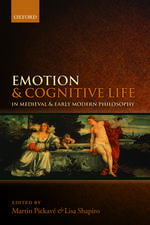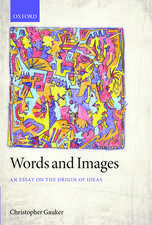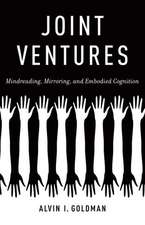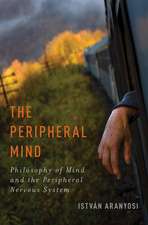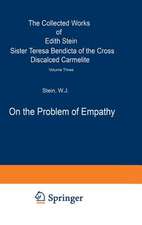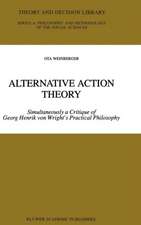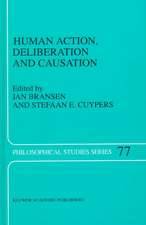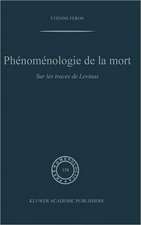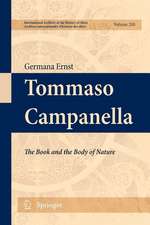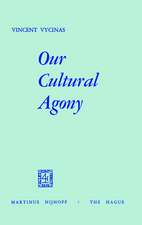Mental Symbols: A Defence of the Classical Theory of Mind: Studies in Cognitive Systems, cartea 19
Autor P. Novaken Limba Engleză Hardback – 31 dec 1996
| Toate formatele și edițiile | Preț | Express |
|---|---|---|
| Paperback (1) | 640.37 lei 6-8 săpt. | |
| SPRINGER NETHERLANDS – 11 oct 2012 | 640.37 lei 6-8 săpt. | |
| Hardback (1) | 645.79 lei 6-8 săpt. | |
| SPRINGER NETHERLANDS – 31 dec 1996 | 645.79 lei 6-8 săpt. |
Din seria Studies in Cognitive Systems
-
 Preț: 401.79 lei
Preț: 401.79 lei -
 Preț: 364.14 lei
Preț: 364.14 lei - 15%
 Preț: 643.48 lei
Preț: 643.48 lei -
 Preț: 360.56 lei
Preț: 360.56 lei - 18%
 Preț: 1228.77 lei
Preț: 1228.77 lei - 18%
 Preț: 1231.78 lei
Preț: 1231.78 lei - 20%
 Preț: 1907.46 lei
Preț: 1907.46 lei - 15%
 Preț: 645.28 lei
Preț: 645.28 lei - 18%
 Preț: 1222.49 lei
Preț: 1222.49 lei - 18%
 Preț: 1232.57 lei
Preț: 1232.57 lei - 18%
 Preț: 954.77 lei
Preț: 954.77 lei - 20%
 Preț: 1913.75 lei
Preț: 1913.75 lei - 18%
 Preț: 951.47 lei
Preț: 951.47 lei - 15%
 Preț: 645.60 lei
Preț: 645.60 lei - 15%
 Preț: 646.11 lei
Preț: 646.11 lei - 15%
 Preț: 643.84 lei
Preț: 643.84 lei - 18%
 Preț: 952.40 lei
Preț: 952.40 lei - 20%
 Preț: 335.36 lei
Preț: 335.36 lei - 20%
 Preț: 438.39 lei
Preț: 438.39 lei - 15%
 Preț: 647.40 lei
Preț: 647.40 lei - 18%
 Preț: 950.63 lei
Preț: 950.63 lei - 15%
 Preț: 653.98 lei
Preț: 653.98 lei - 18%
 Preț: 957.75 lei
Preț: 957.75 lei - 18%
 Preț: 944.19 lei
Preț: 944.19 lei - 20%
 Preț: 1282.32 lei
Preț: 1282.32 lei - 20%
 Preț: 339.00 lei
Preț: 339.00 lei - 20%
 Preț: 995.09 lei
Preț: 995.09 lei
Preț: 645.79 lei
Preț vechi: 759.76 lei
-15% Nou
Puncte Express: 969
Preț estimativ în valută:
123.57€ • 129.36$ • 102.25£
123.57€ • 129.36$ • 102.25£
Carte tipărită la comandă
Livrare economică 05-19 aprilie
Preluare comenzi: 021 569.72.76
Specificații
ISBN-13: 9780792343707
ISBN-10: 0792343700
Pagini: 267
Ilustrații: XXII, 267 p.
Dimensiuni: 170 x 244 x 23 mm
Greutate: 0.57 kg
Ediția:1997
Editura: SPRINGER NETHERLANDS
Colecția Springer
Seria Studies in Cognitive Systems
Locul publicării:Dordrecht, Netherlands
ISBN-10: 0792343700
Pagini: 267
Ilustrații: XXII, 267 p.
Dimensiuni: 170 x 244 x 23 mm
Greutate: 0.57 kg
Ediția:1997
Editura: SPRINGER NETHERLANDS
Colecția Springer
Seria Studies in Cognitive Systems
Locul publicării:Dordrecht, Netherlands
Public țintă
ResearchCuprins
1 Conservative Rationalism I.- 1.1 Common-sense Psychology.- 1.2 The Supervenience Chain.- 1.3 The Nomic Theory of Reference.- 1.4 Casus Belli.- 1.5 Nomenclature.- 2 The Idea as World and Will A Belief in a Contribution of Environment to Meaning and a Division of Semantic Labour.- 2.1 The Ambiguous Meaning of “Meaning ”.- 2.2 The Will to Linguistic Power.- 3 Sentence-based Semantics Early Steps toward Semantic Holism.- 3.1 Motivation for Semantic Holism.- 3.2 Frege on Term-based Semantics.- 3.3 Russell on Term-based Semantics.- 3.4 Carnap’Semantic Verificationism.- 4 Radical Empiricism I.- 4.1 Meaning and Non-existent Entities.- 4.2 The Separation of Meaning and Reference.- 4.3 Mental and Mind-Independent Semantic Universals.- 5 Radical Empiricism II.- 5.1 Two Major Routes to Semantic Holism.- 5.2 The Route from Verificationism to Holism.- 5.3 The Route from Behaviourism to Holism.- 5.4 Remarks on Middlebrow Pragmatism.- 6 Conservative Rationalism II.- 6.1 The Old Sorcerer’s Supervenience Chain.- 6.2 Misrepresentation and Asymmetric Dependence.- 6.3 The Sociological Phase of Reference.- 7 The Classical Theory of Mind I.- 7.1 Five Ways of Defining Logical Modality.- 7.2 The Classical Theory of Mind.- 7.3 The Classical Theory of Representation.- 7.4 Aspects of the Classical Theory of Knowledge.- 7.5 Modal Properties in the Model Code.- 7.6 The Complex Ideas of Implication.- 7.7 The Complex A Priori Idea of Valid Deductive Inference.- 7.8 Remarks on CTM and Analytic Philosophy.- 8 The Classical Theory of Mind II.- 8.1 The Ontology and Architecture of CTM.- 8.2 Learning, Memory, and Association in Aplysia.- 8.3 Learning, Memory, and Association in Vertebrates.- 8.4 The Genetic Code, the Mental Code.- 8.5 History, Histology, and the Molecular Level of Analysis.- 9The Classical Theory of Mind III.- 9.1 Toward an Integrated Account of Mind.- 9.2 The Symbolic System of a Deep-layer, Long-term-store Psychic Cell.- 9.3 The Mind as a System of Psychic Cells.- 9.4 The Mind and its External Affairs.- 10 The Tale of Russell’s Paradox.- 10.1 The Misty Origins of Analytic Philosophy.- 10.2 Russell’s Sophism in the Classical Theory of Mind.- 10.3 The Well-Formedness of the Mind.- Epilogue.
